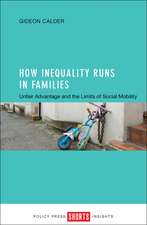How Groups Matter: Challenges of Toleration in Pluralistic Societies: Routledge Studies in Social and Political Thought
Editat de Gideon Calder, Magali Bessone, Federico Zuoloen Limba Engleză Paperback – 30 iun 2020
| Toate formatele și edițiile | Preț | Express |
|---|---|---|
| Paperback (1) | 384.86 lei 6-8 săpt. | |
| Taylor & Francis – 30 iun 2020 | 384.86 lei 6-8 săpt. | |
| Hardback (1) | 1060.87 lei 6-8 săpt. | |
| Taylor & Francis – 13 ian 2014 | 1060.87 lei 6-8 săpt. |
Din seria Routledge Studies in Social and Political Thought
-
 Preț: 152.43 lei
Preț: 152.43 lei -
 Preț: 296.65 lei
Preț: 296.65 lei -
 Preț: 311.70 lei
Preț: 311.70 lei -
 Preț: 310.96 lei
Preț: 310.96 lei -
 Preț: 347.93 lei
Preț: 347.93 lei -
 Preț: 310.41 lei
Preț: 310.41 lei -
 Preț: 303.89 lei
Preț: 303.89 lei -
 Preț: 319.08 lei
Preț: 319.08 lei -
 Preț: 333.32 lei
Preț: 333.32 lei -
 Preț: 309.82 lei
Preț: 309.82 lei -
 Preț: 287.68 lei
Preț: 287.68 lei -
 Preț: 324.20 lei
Preț: 324.20 lei -
 Preț: 389.38 lei
Preț: 389.38 lei -
 Preț: 229.38 lei
Preț: 229.38 lei -
 Preț: 310.29 lei
Preț: 310.29 lei -
 Preț: 311.41 lei
Preț: 311.41 lei -
 Preț: 318.31 lei
Preț: 318.31 lei -
 Preț: 216.07 lei
Preț: 216.07 lei -
 Preț: 354.07 lei
Preț: 354.07 lei -
 Preț: 279.47 lei
Preț: 279.47 lei -
 Preț: 347.26 lei
Preț: 347.26 lei -
 Preț: 387.03 lei
Preț: 387.03 lei - 18%
 Preț: 1110.47 lei
Preț: 1110.47 lei - 18%
 Preț: 1055.51 lei
Preț: 1055.51 lei - 18%
 Preț: 1058.43 lei
Preț: 1058.43 lei - 18%
 Preț: 1005.73 lei
Preț: 1005.73 lei -
 Preț: 409.73 lei
Preț: 409.73 lei - 18%
 Preț: 1061.84 lei
Preț: 1061.84 lei - 18%
 Preț: 1061.22 lei
Preț: 1061.22 lei - 25%
 Preț: 544.67 lei
Preț: 544.67 lei - 18%
 Preț: 1215.71 lei
Preț: 1215.71 lei - 18%
 Preț: 998.71 lei
Preț: 998.71 lei - 18%
 Preț: 1109.99 lei
Preț: 1109.99 lei -
 Preț: 488.71 lei
Preț: 488.71 lei - 30%
 Preț: 847.73 lei
Preț: 847.73 lei -
 Preț: 416.12 lei
Preț: 416.12 lei - 18%
 Preț: 1054.75 lei
Preț: 1054.75 lei - 28%
 Preț: 769.72 lei
Preț: 769.72 lei - 18%
 Preț: 1059.84 lei
Preț: 1059.84 lei -
 Preț: 489.99 lei
Preț: 489.99 lei - 18%
 Preț: 1062.31 lei
Preț: 1062.31 lei - 18%
 Preț: 1108.42 lei
Preț: 1108.42 lei -
 Preț: 382.65 lei
Preț: 382.65 lei - 42%
 Preț: 181.06 lei
Preț: 181.06 lei - 26%
 Preț: 822.36 lei
Preț: 822.36 lei
Preț: 384.86 lei
Nou
Puncte Express: 577
Preț estimativ în valută:
73.64€ • 76.89$ • 60.81£
73.64€ • 76.89$ • 60.81£
Carte tipărită la comandă
Livrare economică 15-29 aprilie
Preluare comenzi: 021 569.72.76
Specificații
ISBN-13: 9780367601003
ISBN-10: 0367601001
Pagini: 252
Dimensiuni: 152 x 229 x 18 mm
Greutate: 0.34 kg
Ediția:1
Editura: Taylor & Francis
Colecția Routledge
Seria Routledge Studies in Social and Political Thought
Locul publicării:Oxford, United Kingdom
ISBN-10: 0367601001
Pagini: 252
Dimensiuni: 152 x 229 x 18 mm
Greutate: 0.34 kg
Ediția:1
Editura: Taylor & Francis
Colecția Routledge
Seria Routledge Studies in Social and Political Thought
Locul publicării:Oxford, United Kingdom
Public țintă
Postgraduate and UndergraduateCuprins
Introduction Magali Bessone, Gideon Calder and Federico Zuolo Part I: Situating Groups, Evaluating Group Rights 1. Representing Groups Gideon Calder 2. Toleration, Groups, and Multiculturalism Sune Lægaard 3. Collective Rights, Public Goods, and Participatory Goods Peter Jones 4. States’ Rights as Group Rights: An Analytical Perspective Adina Preda 5. Resolving the Dilemma of Group Membership Suzy Killmister 6. Groups and Affirmative Action Daniel Sabbagh Part II: Groups in Practice: Constructed Identities, Specific Treatments and Legal Recognition 7. Toleration and Purpose-Built Mosques: Contestations in Contemporary Europe Anna Elisabetta Galeotti 8. Toleration, Respect, and the Cultural Defense Emanuela Ceva 9. Political, Not Ethno-Cultural: A Normative Assessment of Roma Identity in Europe Magali Bessone and Sophie Guérard de Latour 10. The Emergence and Regulation of Minority Religious Groups in Europe Giorgos Kentas and Achilles C. Emilianides 11. Beyond Groups? Types of Sharing and Normative Treatment Federico Zuolo
Notă biografică
Gideon Calder is Reader in Ethics and Social Philosophy at the University of South Wales.
Magali Bessone is Assistant Professor in Political Philosophy at University of Rennes 1, and a Junior Member of the Institut Universitaire de France.
Federico Zuolo is Research Fellow at the University of Pavia, Italy.
Magali Bessone is Assistant Professor in Political Philosophy at University of Rennes 1, and a Junior Member of the Institut Universitaire de France.
Federico Zuolo is Research Fellow at the University of Pavia, Italy.
Descriere
This volume asks: what problems are posed to political philosophy by a collection of individuals who act or are treated in a collective way? Focusing not only on ways in which institutions should treat groups, but also on the normative implications of considering groups as possible social agents, when acting either in vertical relations with the















